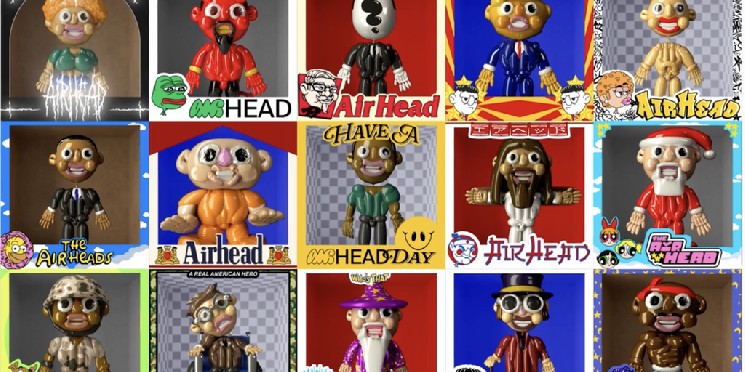Arthur Hayes: Why Bitcoin Ordinals Project Airhead Isn’t Another ‘Boring’ NFT Drop

BitMEX co-founder Arthur Hayes is launching a Bitcoin Ordinals collection dubbed Airhead, entering the market for Bitcoin-based collectibles by releasing a clutch of ballooned characters.
Comprising 10,000 NFT-like assets, the batch of inflated profile pictures (PFP) stem from a collaboration with Oyl Wallet. The digital wallet for Bitcoin launched earlier this month, and on Thursday began allowlisting would-be buyers for the Airhead drop. The startup counts Hayes’ family office Maelstrom as an investor.
“It’s not like you’re just offering them an NFT but on Bitcoin,” Hayes said in an interview with Decrypt. “It’s a completely different thing that speaks to things that Bitcoiners care about.”
Developer Casey Rodarmor launched Bitcoin Ordinals early last year, and the protocol quickly gave rise to a buzzy market for Bitcoin-based collectibles. With the rollout of Rodarmor’s Runes protocol in April alongside Bitcoin’s halving, however, momentum has somewhat shifted toward fungible tokens, mirroring the meme coin meta present in the larger crypto space.
Here is my curatorial essay as to why Airheads are dank as fuck. https://t.co/8xkNOFBI5F pic.twitter.com/5Yt7aP6gDh
— Arthur Hayes (@CryptoHayes) July 31, 2024
Using so-called recursive inscriptions, Airheads feature functionality that’s currently lacking for collectibles on other networks, Hayes said.
Based on the value of the Bitcoin wallet minting an Airhead, the character’s body will inflate. It was essential, from Hayes’ perspective, that Airheads bring something new to the digital art space while leveraging Ordinals-specific tech.
“I don’t want to get through another 10,000-character, AI-generated PFP drop,” Hayes said of releasing digital art. “We’ve done that so many fucking times. It’s boring.”
The same technology underpinning how Airheads blow up visually is the same functionality that a project called Pizza Ninjas used to create a game emulator on Bitcoin. Last year, recursive inscriptions were tapped as a way to create a music engine on Bitcoin too. In essence, recursive inscriptions enable more complex Bitcoin apps by tapping data from multiple Ordinals.
Airhead social media messaging lands somewhere between sarcasm and shitposting, and while project creative director and Oly’s Head of Product Cole Jorissen told Decrypt that the collection riffs on the body positivity movement, the project appears to be poking fun in any and all directions.
sneak peak of the fat-o-meter. might fuck around and open whitelist later this week. pic.twitter.com/CwOHfV0GMR
— Airhead (@AirheadFun) August 12, 2024
“We’re celebrating wealth as a character feature—fatness as a metaphor for wealth,” he said.
Hayes said that Ordinals appeal to a different audience than NFTs on Ethereum and Solana because Bitcoin has the largest market cap and mindshare of any digital asset. And with Bitcoin closer to an all-time high price than other coins, he said, more people might buy digital art too.
“When you’re down money, you’re not going to invest in digital art,” Hayes said. “I think Ordinals are special and will be collected as Bitcoin breaks out of this range that we’re in.”
Around $128 million worth of NFTs have traded hands on Ethereum over the past month, according to data from CryptoSlam. Compared to the $89 million in sales on Solana and $70 million sales on Bitcoin during that span, it means the network that popularized NFTs is still the industry’s leader.
At the same time, Hayes is taking a long-term view toward Ordinals. When the last Bitcoin is mined sometime around the year 2140, fees from people transacting Ordinals could help bolster rewards for miners while incentivizing them to keep the network secure, Hayes said.
“At the end of the day, we need to generate transaction fees for miners,” he said. “The most important thing to bring to Bitcoin is a digital cultural experience, because that gets new people to use it.”
Edited by Andrew Hayward



 Bitcoin
Bitcoin  Ethereum
Ethereum  Tether
Tether  USDC
USDC  Dogecoin
Dogecoin  TRON
TRON  Cardano
Cardano  Chainlink
Chainlink  Bitcoin Cash
Bitcoin Cash  LEO Token
LEO Token  Litecoin
Litecoin  Dai
Dai  Monero
Monero  Ethereum Classic
Ethereum Classic  Stellar
Stellar  Stacks
Stacks  OKB
OKB  Cronos
Cronos  Hedera
Hedera  Cosmos Hub
Cosmos Hub  Maker
Maker  Theta Network
Theta Network  KuCoin
KuCoin  Gate
Gate  Algorand
Algorand  Polygon
Polygon  NEO
NEO  EOS
EOS  Zcash
Zcash  Tether Gold
Tether Gold  Tezos
Tezos  TrueUSD
TrueUSD  Synthetix Network
Synthetix Network  IOTA
IOTA  Bitcoin Gold
Bitcoin Gold  Holo
Holo  Dash
Dash  Zilliqa
Zilliqa  0x Protocol
0x Protocol  Siacoin
Siacoin  Enjin Coin
Enjin Coin  Ravencoin
Ravencoin  Basic Attention
Basic Attention  Qtum
Qtum  Decred
Decred  Ontology
Ontology  NEM
NEM  Lisk
Lisk  Nano
Nano  Numeraire
Numeraire  Pax Dollar
Pax Dollar  DigiByte
DigiByte  Waves
Waves  Status
Status  Hive
Hive  Huobi
Huobi  Steem
Steem  BUSD
BUSD  Ren
Ren  OMG Network
OMG Network  Bitcoin Diamond
Bitcoin Diamond  Bytom
Bytom  Kyber Network Crystal Legacy
Kyber Network Crystal Legacy  HUSD
HUSD